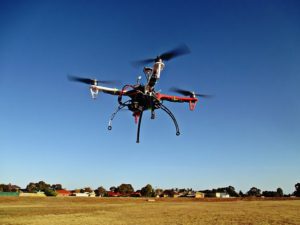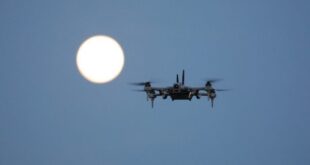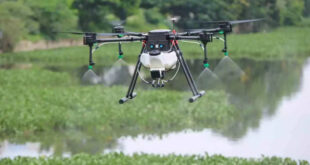New EU drone regulations will necessitate changes for much of the European drone industry, as companies work to comply with regulations that will be enforced throughout the European Union. In this piece by EU Law Regulatory Consultant of Porat Group, Ella Rosenberg points out that EU drone regulations impact not just companies in member states, but anyone who wants to do business in Europe.
The following is a guest post by Ella Rosenberg. DRONELIFE neither accepts nor makes payments for guest posts.
Drones have always been the subject of military and commercial importance on the one hand, and raw regulatory anticipation on the other. From logistical maritime commercial drones to camera drones, the market has experienced a shift within the past few years. Unlike other forms of aviation, modern drones are a relatively new field, which up until now did not have a harmonized regulatory system in the European Union.
Up until a few months ago drones have been the subject of relative regulatory freedom in the EU. Yet, under the careful scrutiny of the previous EU Commission, a new regulatory framework for drones has been established in a form of a Regulation.
A Regulation, unlike a Directive, entails ad-hoc harmonization of the entire legal framework in a set jurisdiction. Within the EU regulatory framework, this necessitates all of the twenty seven individual laws of the Member States combine into one streamline legal framework.
When applying this method of legislative procedure to the realm of drones, several adjustments need to be taken by drone operators and drone manufactures to operate in the EU, as they work to meet criteria that will be implemented on a modular basis by the European Union Aviation Safety Agency (hereinafter- EASA) and local Member State Agencies.
Criteria
The criteria for the new regulation are threefold. First, the registration of UAV operators and certified drones becomes mandatory on July 1st 2020. Second, three categories of UAV will be applicable for classification- “Specific”, “Open” and “Certified”.
The Specific category includes the registration of UAS operations that are considered high risk, and includes an authorization prior to the operation itself. The Open category on the other hand, does not require authorization or registration. The third category, the “Certified” category requires certification of the UAS, a licensed remote pilot and an approved operator.
The timeline of the implementation also plays an important factor in the categorization of the Regulation. The categorization will be implemented by July 1st 2020, with a year for implementation and conversion by Member States to the new system by July 1st 2021, and by July 1st 2022 operations conducted in the open category should be implemented in accordance to the EU regulation. Associations and clubs should receive authorization by the EASA.
Assessment
It is imperative that drone operators and drone manufacturers comply with the new EU regulatory framework, or they risk non-compliance with the EASA, which can in turn lead to heavy fines. Although the EASA has not started to enforce the new regulatory framework, it is anticipated that they will start enhanced enforcement in July.
Local Member State Aviation regulators are expected to collaborate with the EASA on implementation of the Regulation, taking mutual responsibility for the entire process, until full implementation in 2022, when responsibility for enforcement will fully transfer to the EASA.
Operators and manufacturers in states that are not in the EU, states with Association Agreements with the EU, and those that have access to the EU Market, whether in the air space or maritime space of the EU, or even in cases of maritime logistic drones in EU ports, need to fully comply with the new regulatory framework or risk disbarment from the Market.
It is in these uncertain times, especially during the Covid-19 pandemic, that over-regulation is widely discussed not only in the corridors of the EU Institutions in Brussels, but also in the parliaments, agencies and ministries of the Member States. At first glance it may seem that the measures imposed by the EU Regulator on the drone industry are overprotective and may hinder the Market.
Be that as it may, the regulatory framework designated by the EASA will not only level the commercial and maritime drone playing field in the EU, but it will also set the tone for other high-risk industries on how to create a fair and commercially viable minimum regulatory system, which the financial sector for in instance, is in dire need of.
Ella Rosenberg is EU Law Regulatory Consultant, Porat Group and CEO, Israel EU Chamber of Commerce and Industry. She primarily deals with high risk industries in Israel and Europe. Ella holds an LLB in EU Law from the European Law School, Maastricht University and an LLM in Commercial and Company Law from Erasmus School of Law, Erasmus University Rotterdam. Ella consults on AML in the crypto currency industry, Blockchain, AI, drone regulation, EU firearms regulatory framework, Art industry, financial arbitration and tokenization of maritime logistics. She also focuses on Foreign Trade Agreements of the EU and Israel, TRIPS and GATT agreements, WTO Law and EU Legal Policy. Ella serves as a member of Europe Forum in Israel, and actively consults the public and governmental sector in Israel on the EU Regulatory Framework.
Miriam McNabb is the Editor-in-Chief of DRONELIFE and CEO of JobForDrones, a professional drone services marketplace, and a fascinated observer of the emerging drone industry and the regulatory environment for drones. Miriam has penned over 3,000 articles focused on the commercial drone space and is an international speaker and recognized figure in the industry. Miriam has a degree from the University of Chicago and over 20 years of experience in high tech sales and marketing for new technologies.
For drone industry consulting or writing, Email Miriam.
TWITTER:@spaldingbarker
Subscribe to DroneLife here.
https://dronelife.com/2020/05/26/easa-eu-drone-regulation/
 Unmanned Aerial Vehicle The latest drone news
Unmanned Aerial Vehicle The latest drone news





